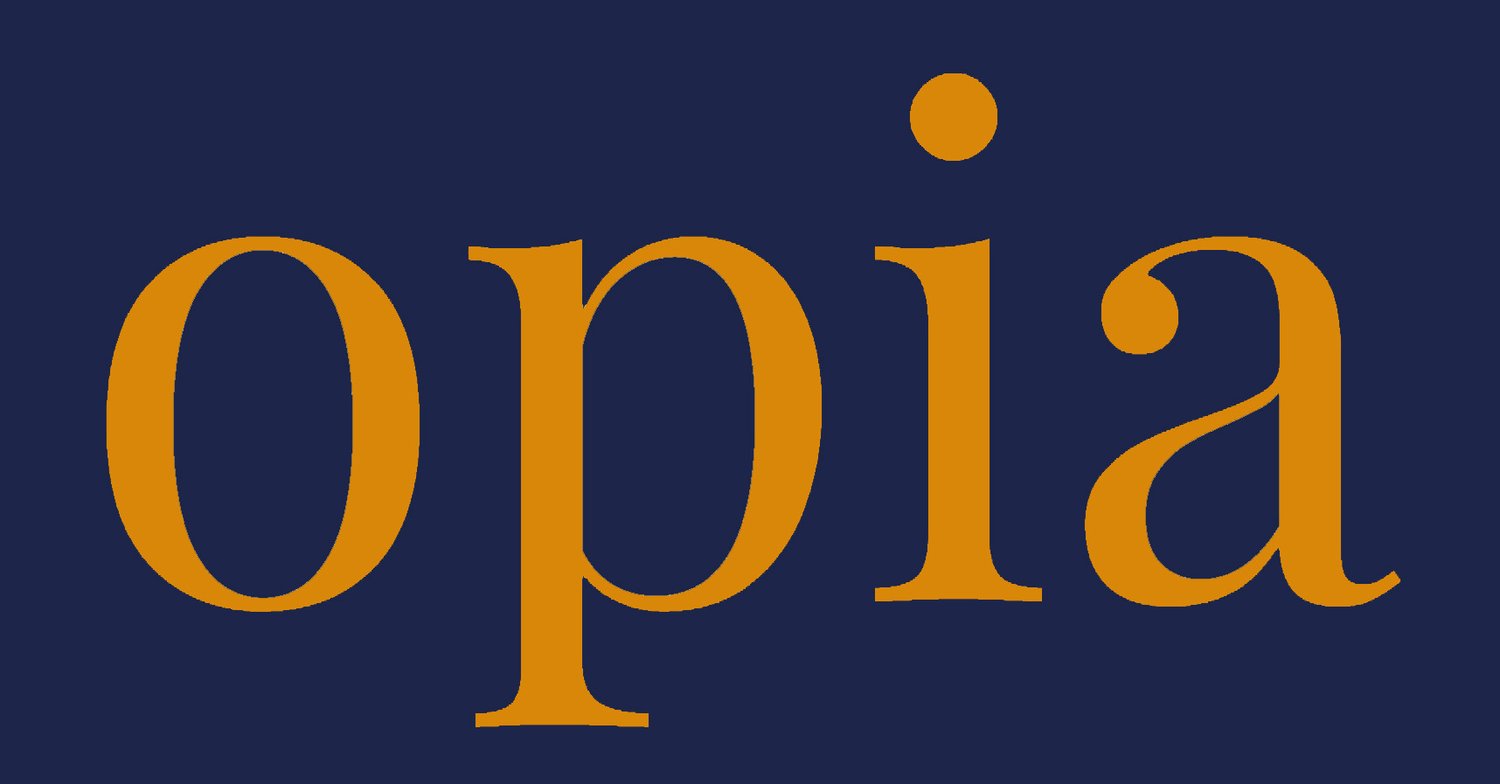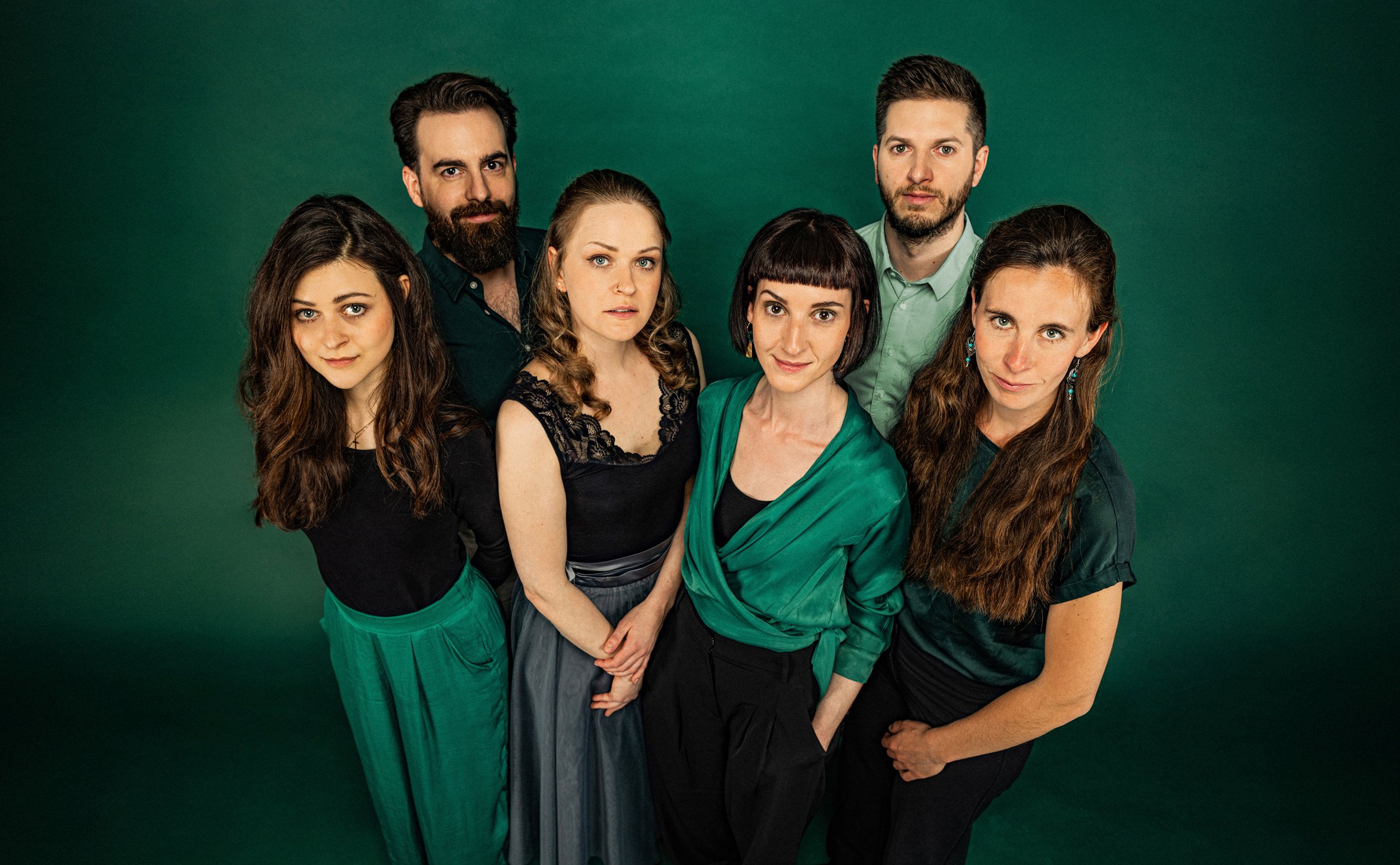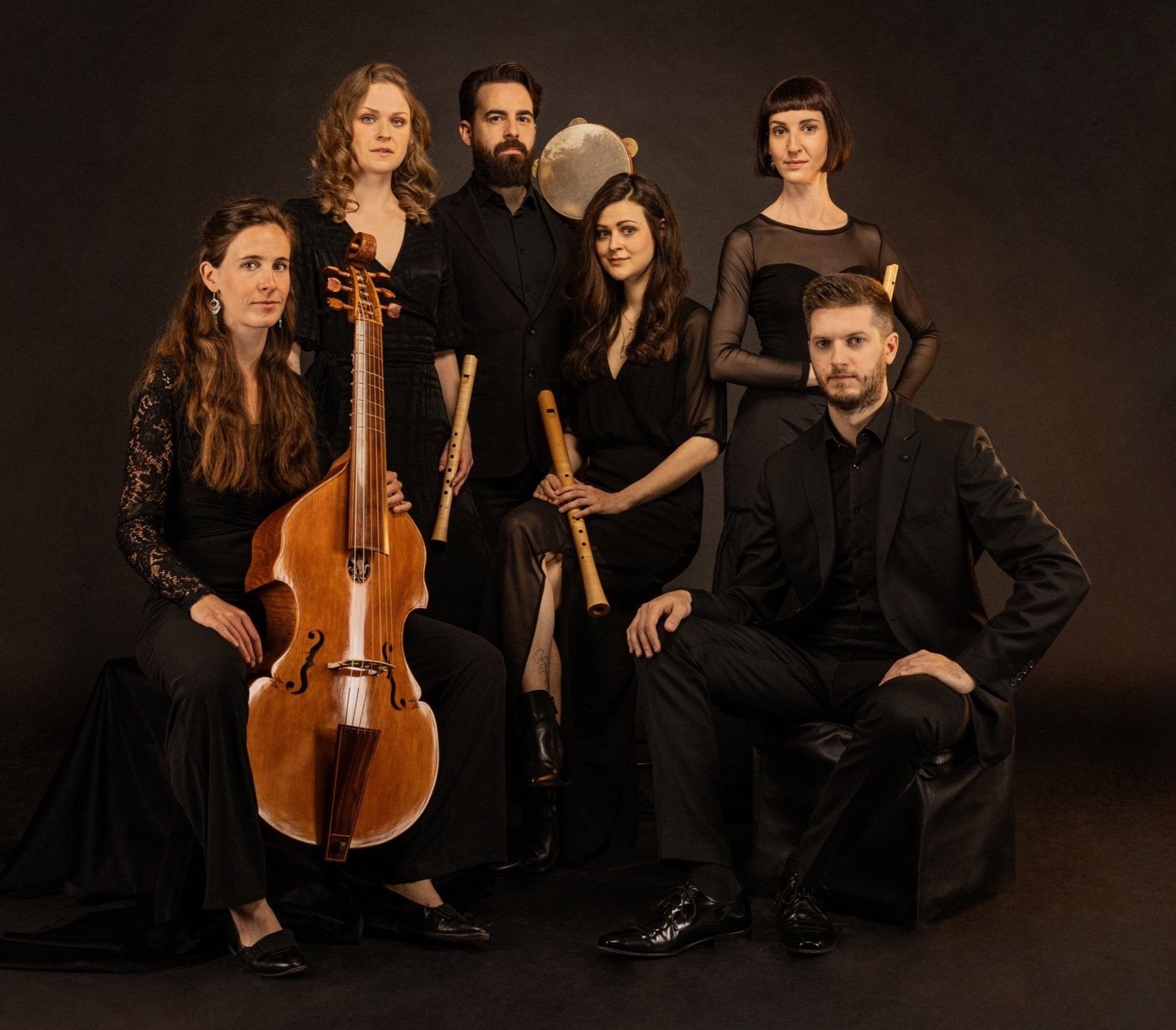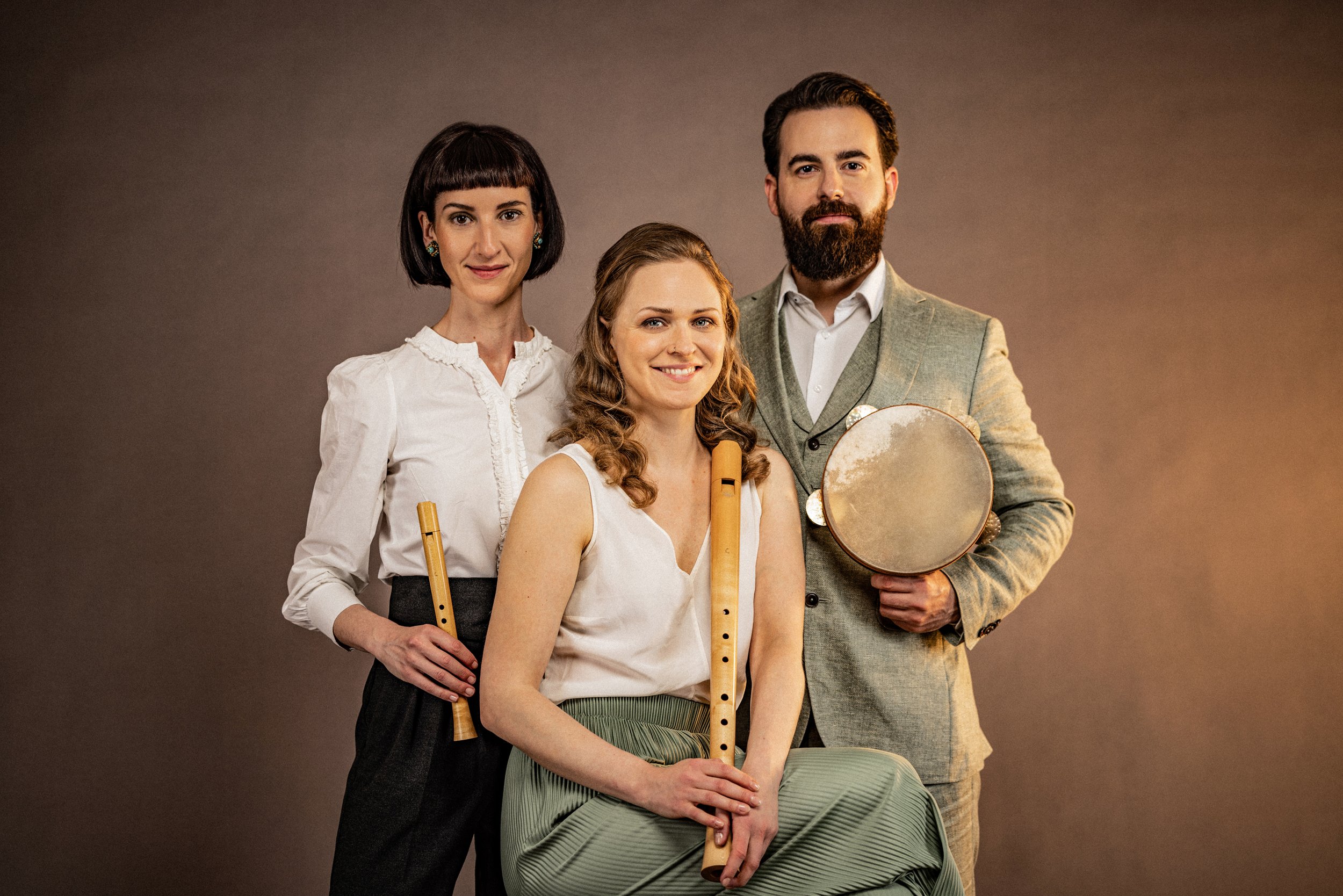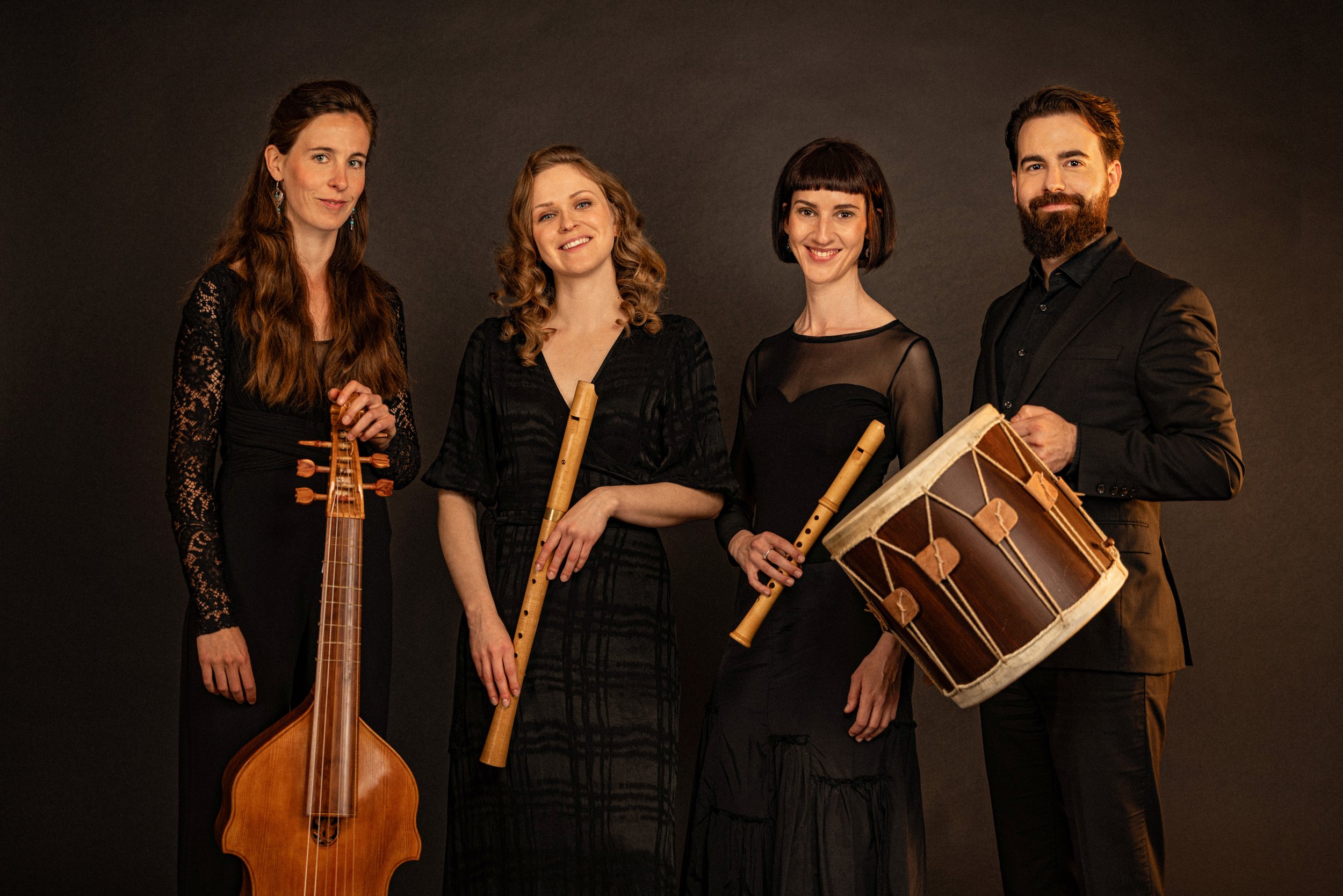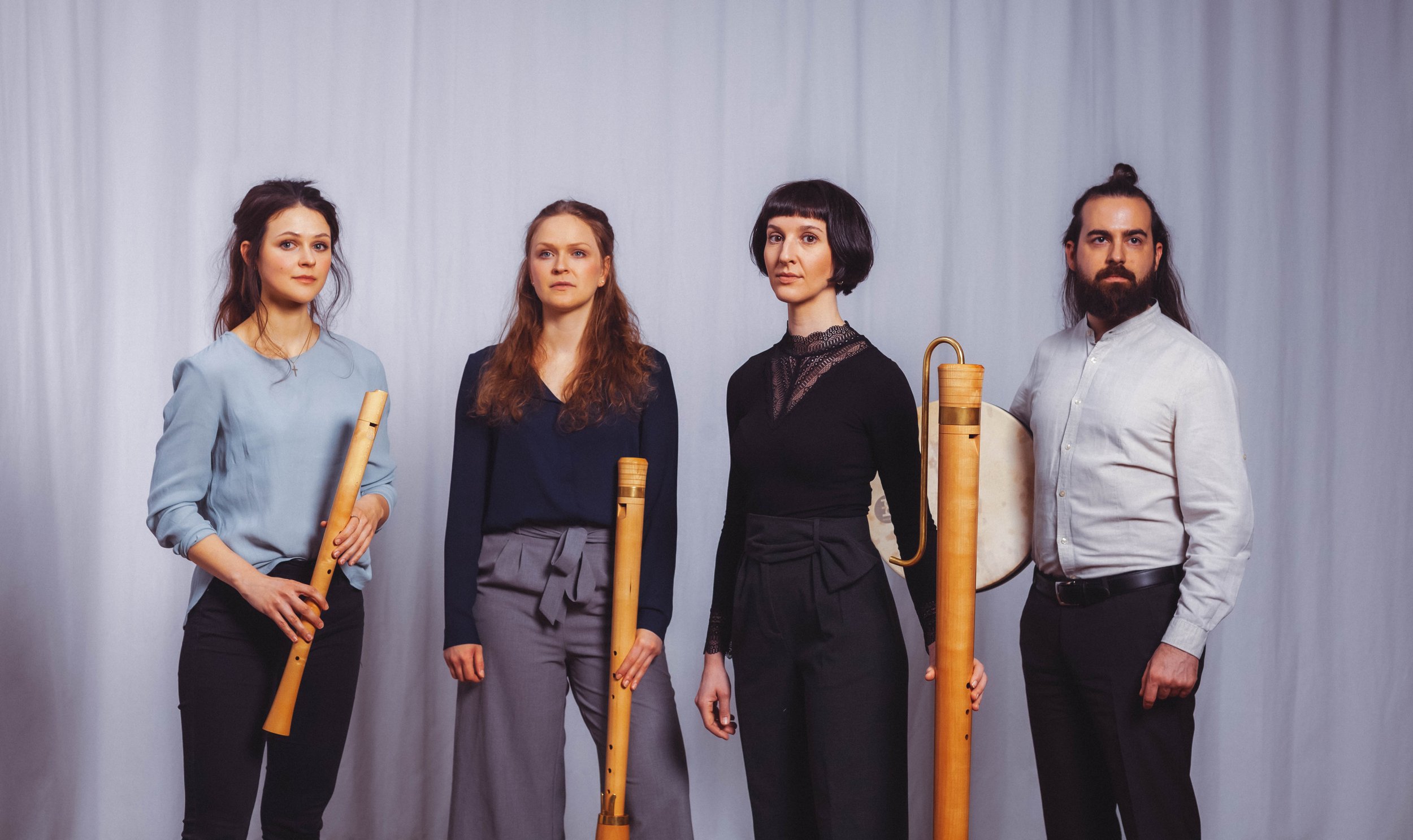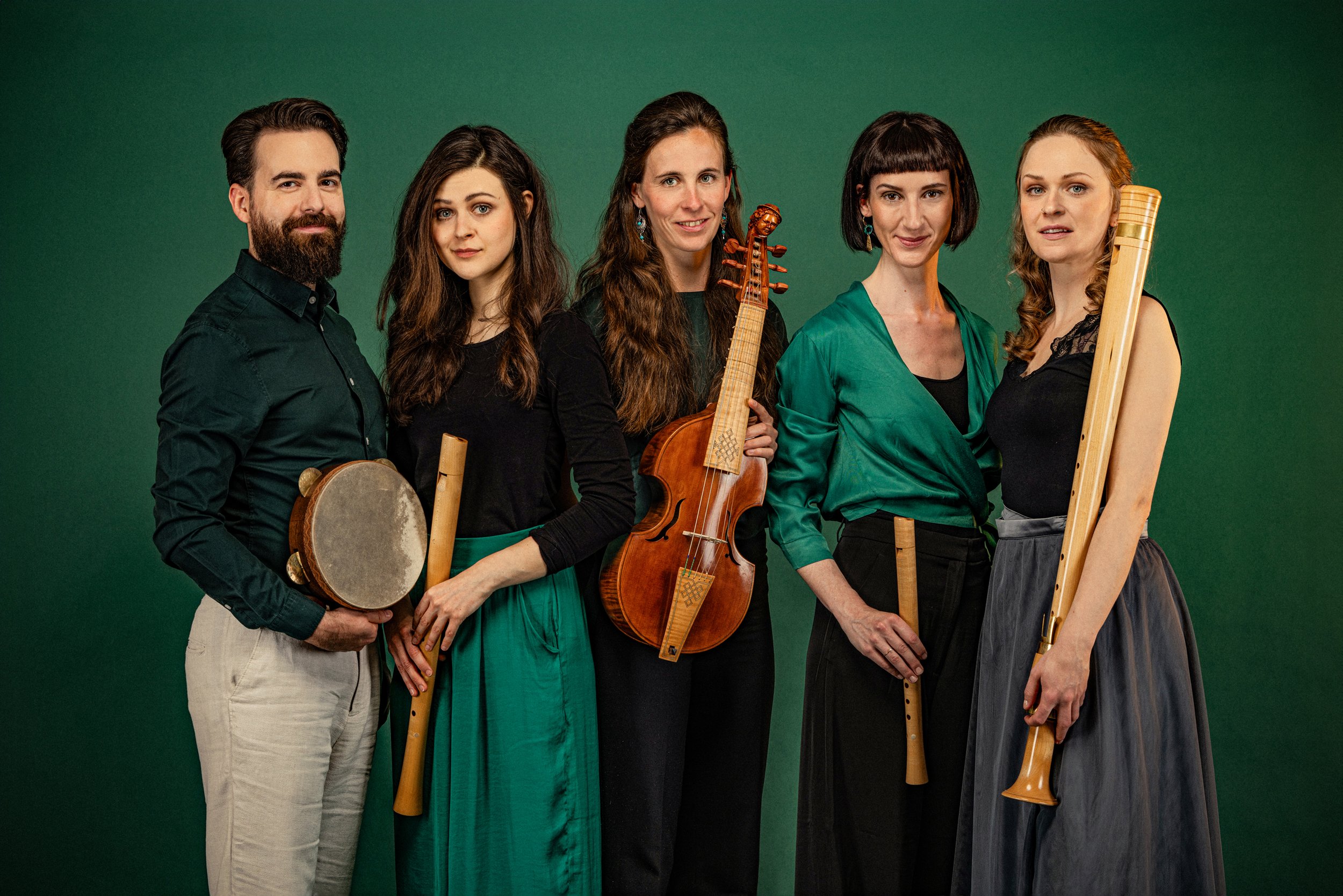Ensemble for contemporary Interpretation of Early Music | Late Middleages – Renaissance – Early Baroque
opia unites 6 musicians in search of tonal diversity, rhythmical finesse and experimental joy - Eva Leonie Fegers, soprano, recorders , Alina Loewenich, recorders, Fabio Kapeller, percussion, Friederike Vollert, recorders, Julia Willeitner, viols and Alexander Gergelyfi, historical keyboard instruments.
After several years of collaboration in various constellations, the musicians Fegers, Loewenich and Kapeller founded the ensemble in spring 2019, the musicians Alexander Gergelyfi, Friederike Volkert and Julia Willeitner then joined the consort.
In the founding year, they had already reached the final of the Tel Aviv Recorder Competition (ISR). In July they won the 2nd Prize at the Concorso di Musica Antica "Maurizio Pratola ", L'Aquila (ITA). The CD production as you like it. was awarded an art grant during the 2022 Bank Austria Crowdfunding. The CD was released in 2023 by ArsProduktion.
opia has performed in Austria, Germany, Italy and Israel and has appeared at renowned festivals such as the Grafenegg Festival (AUT), the Innsbruck Early Music Festival (AUT) and the Hohenloher Kultursommer (DEU). In the 2024 season, engagements will include the Shakespeare Festival at the Globe Theater Neuss (DEU) and the Serenades of the Brucknerhaus Linz (AUT). The musicians have also taken part in several productions for the radio stations Ö1 and BR-Klassik.
Their CD production as you like it. was awarded an arts grant from the Bank Austria Crowdfunding in 2022. The CD was released by ARS Produktion in 2023.
The focus of the ensemble is on the lively interpretation, recomposition and improvisation of music from the Late Middle Ages, the Renaissance and the Early Baroque.
watch
as you like it. Imagevideo
Claudio Monteverdi (1567-1643) Sì dolce è'l tormento from: Quatro Scherzo delle Ariose Vaghezza Venice: Alessandro Vincenti, 1624 Arrangement: opia
members
Eva Leonie Fegers
Eva Leonie Fegers is a musician living and working in Vienna and Eisenstadt – recorder and renaissance transverse flute player,
singer, music teacher and artistically creative artist.
Alina Loewenich
The recorder player Alina Loewenich, based in Vienna and Cologne, dedicates herself as a soloist, performance artist, ensemble player and music teacher to Early and Contemporary Music.
Fabio Kapeller
Fabio Kapeller is a percussionist and project manager based in Vienna, Austria.
Friederike Vollert
Friederike Vollert is a recorder player - living and teaching in Regensburg, traveling around as a soloist and a passionate ensemble player
Julia Willeitner
Julia Willeitner is a gamba and cello player from Passau, where she lives in a wooden hut and, in addition to early music, often makes a detour into South American folk music. At opia she devotes herself entirely to the viols, both small and large.
Alexander Gergelyfi
Alexander Gergelyfi, historical keyboards player, is living and working in Vienna and Graz.
Guillaume de Machaut (1300-05 – 1377) – Dame, se vous m‘estes lointeinne
opia
Eva Leonie Fegers – Recorder & Vocals
Alina Loewenich – Recorder
Fabio Kapeller – Percussion
Veronika Weidner – Recording & Sound
Vienna, 2019
Giovanni Domenico da Nola (1510-20 – 1592) – Chi la Gagliarda
opia
Eva Leonie Fegers – Recorder
Alina Loewenich – Recorder
Magdalena Kelz – Viol
Fabio Kapeller – Percussion
Veronika Weidner – Recording & Sound
Vienna, 2019
Jacobi Arcadelt (1507 – 1568) – Je ne veux plus
opia
Eva Leonie Fegers, Alina Loewenich, Paula Pinn – Recorder Consort
Fabio Kapeller – Percussion
Veronika Weidner – Recording & Sound
Vienna, 2019
impressions
programmes
sì dolce
The Italian music from around 1600 represents an incredible variety of styles: Tradition meets change, polyphony encounters affective monody, strict counterpoint emerges to the development of the thorough bass, dance music meets lyrical madrigals, melancholic sound art comes across shimmering diminutions. A rousing discourse between the power of harmony and the longing for intelligibility.
opia interprets these artistic and soulful vocal and instrumental works by Luca Marenzio, Biagio Marini, Cipriano de Rore and others with recorders, viol, harpsichord and percussion.
I am the music that knows how to soothe every tortured heart with sweet tones, and which can ignite icy tempers sometimes with noble anger and sometimes with love.
from: L‘Orfeo von Claudio Monteverdi, 1600
as you like it.
As you like it – humorously, sensually, dramatically.
Inspired by Shakespeare's comedy of mistaken identity, we also move musically between the worlds: We discover the savoir vivre at the French court, hurry to the convivial Viennese tavern, flee from the plague into the warm embrace of English melancholy, overcome deep rivers in the solitude of the German forest, feel the mild Italian west wind on our skin and dream of great love on the Spanish coast at night. The ears are buzzing, the head is wondering: Is it the original, an adaptation or is it something we wrote ourselves? Who knows, who knows…
Eva Leonie Fegers – recorder & soprano
Alina Loewenich – recorder
Friederike Vollert – recorder
Julia Willeitner – viol
Alexander Gergelyfi – harpsichord
Fabio Kapeller – percussion
Ξ xi
With Ξ xi, three musicians embark on the exciting, experimental sound world and improvisational music practice of the 14th century. During the time of the Ars nova in France, the development of polyphony and a complex notation practice took place as well as artistic song forms such as Ballade, Rondeau and Virelai evolved - all of them complex and expressive compositions.
A similar development can be seen around the time in Italy. Popular secular genres are usually associated with stylized themes: in the Caccia hunting scenes are set to sound, in the Ballata one can listen to poetry and in the Madrigal, shepherd idylls, love, suffering and morality are melodized.
There are compositions by Landini, da Bologna, da Firenze a.o.
Eva Leonie Fegers – recorder and soprano
Alina Loewenich – recorder
Fabio Kapeller – percussion
ad astra
Songs of love can be heard right up to the starry sky - portraying joy and pain, desire and despair, intimacy and rejection.
Musically, we are located in the Italian cultural centers of the 16th century: Rome, Milan, Naples and Venice. Melancholic and humorous songs as well as swinging dances give us an impression of a human being and his search for love.
With recorders, vocals, viola da gamba and percussion, opia interprets works by Fattorin da Reggio, Vincenzo Ruffo, Giovanni da Nola a.o.
Eva Leonie Fegers – recorder & soprano
Alina Loewenich – recorder
Julia Willeitner – viol
Fabio Kapeller – percussion
anima mea
The soul unites the variety of all emotions and the spiritual processes. During the Middle Ages and the Renaissance, the existence of the soul, which according to the view also controlled physical processes, was assigned not only to humans but to all living beings.
The anima mea program combines French and Italian vocal and instrumental music from the 14th to the 16th century - the Ars nova, the Trecento and the Renaissance. From the development of polyphonic music to complex counterpoint. Instrumented, arranged and reconstructed for vocals, recorders, fiddle, viola da gamba and percussion. There are compositions by Machaut, Landini, da Nola, Scotto and others.
l’amour fou
The songs are as unpredictable and diverse as love itself.
The program focuses on French Renaissance chansons - interpreted with recorders, vocals and percussion. The works revolve around the theme of love and the different emotional states of the lovers: hope and disappointment, bliss and despair, desire and contempt only reflect a fraction, portrayed by secular compositions from the Franco-Flemish school. In this, the polyphonic and complex contrapuntal compositions of the 15th and 16th centuries experienced an enormous development - the emotional, direct expression though was never lost.
opia plays works by Alexander Agricola, Antoine Brumel, Nicolai Gombert, Josquin Desprez a.o.
Eva Leonie Fegers – recorder & soprano
Alina Loewenich – recorder
Friederike Vollert – recorder
Fabio Kapelle – percussion
Viva!
… Ich wollte, Du und ich, wir wären eine Kraft,
Wir wären eines Blutes
Und ein Erfüllen, eine Leidenschaft,
Ein heisses Weltenliebeslied!
Life is love. A life of passions: joy and pain, desire and despair, intimacy and rejection. Almost obsessively, composers have devoted themselves to setting love to music for centuries. The beguiling melodies of the Renaissance are groundbreaking for the (world) love songs up to this day: virtuosic, sensual and full of joie de vivre!
… Dass wir das Herz des Himmels ganz erfassen
Und uns in jedem Hauche finden
Und überstrahlen alle Ewigkeit!
(from: Else Lasker Schüler, Viva!)
Eva Leonie Fegers – recorder & soprano
Alina Loewenich – recorder
Friederike Vollert – recorder
Julia Willeitner – viol
Fabio Kapeller – percussion
“... surprises at its debut appearance in Neunstetten with very modern and freshly interpreted early music from the Middle Ages to the early Baroque ... a self-contained ensemble that, with the wonderful singer, gives the very successful musical evening a very special note.”
“Eva Leonie Fegers excelled on the recorder, the Renaissance transverse flute and with her wonderful singing; Alina Loewenich fascinated the audience with her beautiful recorder playing; Magdalena Kelz played the viol with inspiration and enthusiasm; Fabio Kapeller shone with great percussion instruments.”
